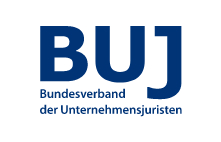Satzungsänderungen zur virtuellen Hauptversammlung:
BUJ-Stellungnahme zu geplanten Empfehlungen des ISS
17.11.2022
Institutional Shareholder Services Inc. (“ISS”) has announced the launch of its open comment period on proposed changes to its benchmark voting policies in early November 2022. During this period ISS intends to annually gather input from institutional investors, companies, and other market constituents to ensure its benchmark voting policy changes take into consideration a broad range of perspectives, including the views of institutional investors globally and those of the broader corporate governance community.
With respect to the proposed changes to ISS’ benchmark voting policies for 2023, the Bundesverband der Unternehmensjuristen e.V. (“BUJ”) would like to take the opportunity to share its views. The BUJ is the largest independent association for legal counsels in companies and other corporations in Germany. The BUJ has approximately 3,000 members, working in around 1,400 companies.
The ISS’ recommendation with respect to virtual-only shareholder meetings in the benchmark voting policy for the AGM season 2023 is as follows:
General Recommendation: Generally vote for proposals allowing for the convening of hybrid shareholder meetings if it is clear that it is not the intention to hold virtual-only AGMs. Generally vote against proposals allowing for the convening of virtual-only shareholder meetings.
From our point of view the ISS’ general recommendation (underlined above) does not sufficiently take into account that the legal framework in Germany with respect to virtual shareholder meetings has significantly changed in July 2022. In this context, the following aspects need to be considered:
- New legislation with strict requirements, shareholder rights fully granted
The vote to add an option (for a maximum period of five years) to hold virtual-only AGMs to the articles of association will be based on the new legal framework. In complete contrast to the legal framework governing virtual AGMs during the COVID-19-pandemic, the new legal framework has fully reinstated shareholder rights in virtual AGMs. The rights of shareholders in physical meetings will be mirrored 1:1 in virtual meetings.
- Interaction between shareholders and management, absolutely no deterioration
As mentioned above, shareholder rights in virtual AGMs will be the same as in physical AGMs. Thus, the opportunities of shareholders and management to interact in virtual AGMs will also be as in physical AGMs. Shareholders will be able to speak, ask questions as well as follow-up questions and submit motions. In addition, shareholders will be given the opportunity to submit speeches in advance of the virtual AGM, an option that is not provided for in advance of physical AGMs. Moreover, the virtual format gives especially investors from abroad the opportunity to easily participate in shareholder meetings. The virtual format will thus increase shareholder participation and engagement in AGMs.
- Sustainability
When holding AGMs in virtual-only format, CO2 emissions will be reduced, in particular through the lack of travel activities to and from the AGMs. In the current situation in Europe regarding energy shortages, this becomes even more relevant.
- Good corporate governance
In light of the COVID-19-pandemic and other possible crises it would not be a prudent decision of a CEO of a public stock corporation not to ensure that the articles of association contain an option to hold shareholder meetings only virtually. As mentioned above, the respective legislation which was applicable during the past three years has been replaced. If corporations refrain from adding a corresponding provision in their articles of association now, they will not be able to hold virtual-only AGMs in the future, even if external circumstances (e.g. further pandemics or other crises) prohibit holding a physical AGM. In our view the principles of prudence and proper governance therefore require the inclusion of such an option in the articles of association. From the company’s perspective it would be rather careless not to have such an option.
Finally, we note that the “ISS 2022 Global Benchmark Policy Survey” was conducted from August 3 until August 31, 2022. The new legislation on virtual shareholder meetings in Germany came into effect on July 27, 2022, just shortly prior to the opening of the survey. In our view it is very likely that results of the 2022 survey did not (or at least not fully) take into account the new legal framework in Germany.
We hope that ISS will consider the aforementioned aspects and reconsider the ISS’ recommendation to generally vote against proposals allowing for the convening of virtual-only shareholder meetings.
